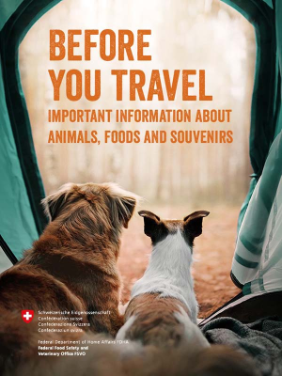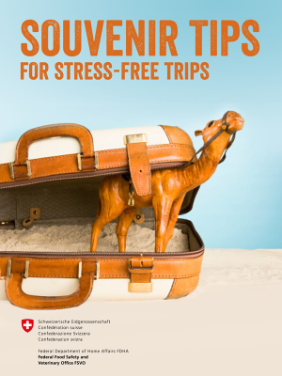Foodstuffs may carry pathogens and contaminants. For this reason, special regulations apply to the importing of foods by private travellers.
The following information applies to private travel with foods for personal use. For specific questions on commercial imports of foods and any species conservation regulations, please consult the import filter.
Entry from the EU, Northern Ireland, Norway and Iceland
Foods may be imported for personal use. Customs regulations apply.
Entry from third countries
Imports prohibited:
- products containing meat, meat products, edible offal such as organ powders, milk or dairy products, with the exception of the foodstuffs listed below;
- animal fats and oils, with the exception of the foodstuffs listed below.
Imports permitted without restrictions:
- Soup stocks and flavourings packaged for the final consumer.
Imports permitted without restrictions, provided products contain no meat, meat products or edible offal:
- Bread, cakes, biscuits and other baked products;
- Chocolate and confectionery (including sweets);
- Pasta;
- Olives stuffed with fish;
- Food supplements packaged for the final consumer which contain processed animal products. Food supplements are foodstuffs whose purpose is to supplement the normal diet. They comprise concentrates of vitamins, minerals or similar substances with a physiological effect and must be provided in dose form to be taken in small measured quantities (capsules, tablets, powder sachet etc.).
Imports permitted without restrictions, provided products contain no meat, meat products, edible offal, milk or dairy products:
- Other composite foodstuffs where less than half of the foodstuff consists of egg products or fishery products.
Imports permitted subject to maximum quantities per person:
Greenland and the Faroe Islands:
- Animal products (apart from fish and fishery products) and animal by-products which are intended for feeding to pets: maximum 10 kg;
- Fresh, gutted fish and fishery products*: no maximum quantities;
- Caviar (without CITES import permit and chargeable CITES import inspection): a maximum of 125 g per person (non-combinable).
Other third countries
- Fresh, gutted fish and fishery products*: maximum 20 kg or a whole fish with no weight limit;
- Caviar (without CITES import permit and chargeable CITES import inspection): a maximum of 125 g per person (non-combinable);
- Honey, eggs, snails (not live), frog’s legs, gelatine, collagen, insects (not live): maximum 2 kg;
- Powdered infant milk, other infant formula and special medical food and feed for humans and animals, provided they can be kept at room temperature, are packaged branded products for direct sale to the final consumer and the packs have not been opened (except in use): maximum 2 kg per person or accompanying animal;
- Certain plant-based foods that are subject to increased controls: maximum 30 kg if intended exclusively for private domestic use.
* Fishery products: All edible forms and parts of aquatic animals (including fish oil). Exceptions are live bivalve molluscs, live echinoderms, live tunicates, live marine gastropods, mammals, reptiles and frogs.
Consignments to private individuals by letter or parcel post
For consignments containing foodstuffs that are sent to private individuals by letter or parcel post, the same rules apply as for consignments imported by private travellers.
Exceptions: Caviar is subject to both permit and control in terms of species protection and the corresponding CITES documents must be available. Powdered infant milk, other infant formula and special medical food (up to 2 kg) may only be imported by private travellers.
The abovementioned facilitations apply only to items addressed to private households. Please ensure that products of non-animal origin are clearly marked as such.
In the customs declaration, the person required to register the goods must give the general permit number. When this number is given, it confirms that the consignment complies with the relevant conditions.
General permit number: 2630/03
An outbreak of an animal disease would lead to a total ban on exports of foods from the country concerned. Please inquire about the current situation before travelling. Animal products must not originate from areas subject to restrictions or surveillance imposed on animal health grounds.
Last modification 01.12.2025






